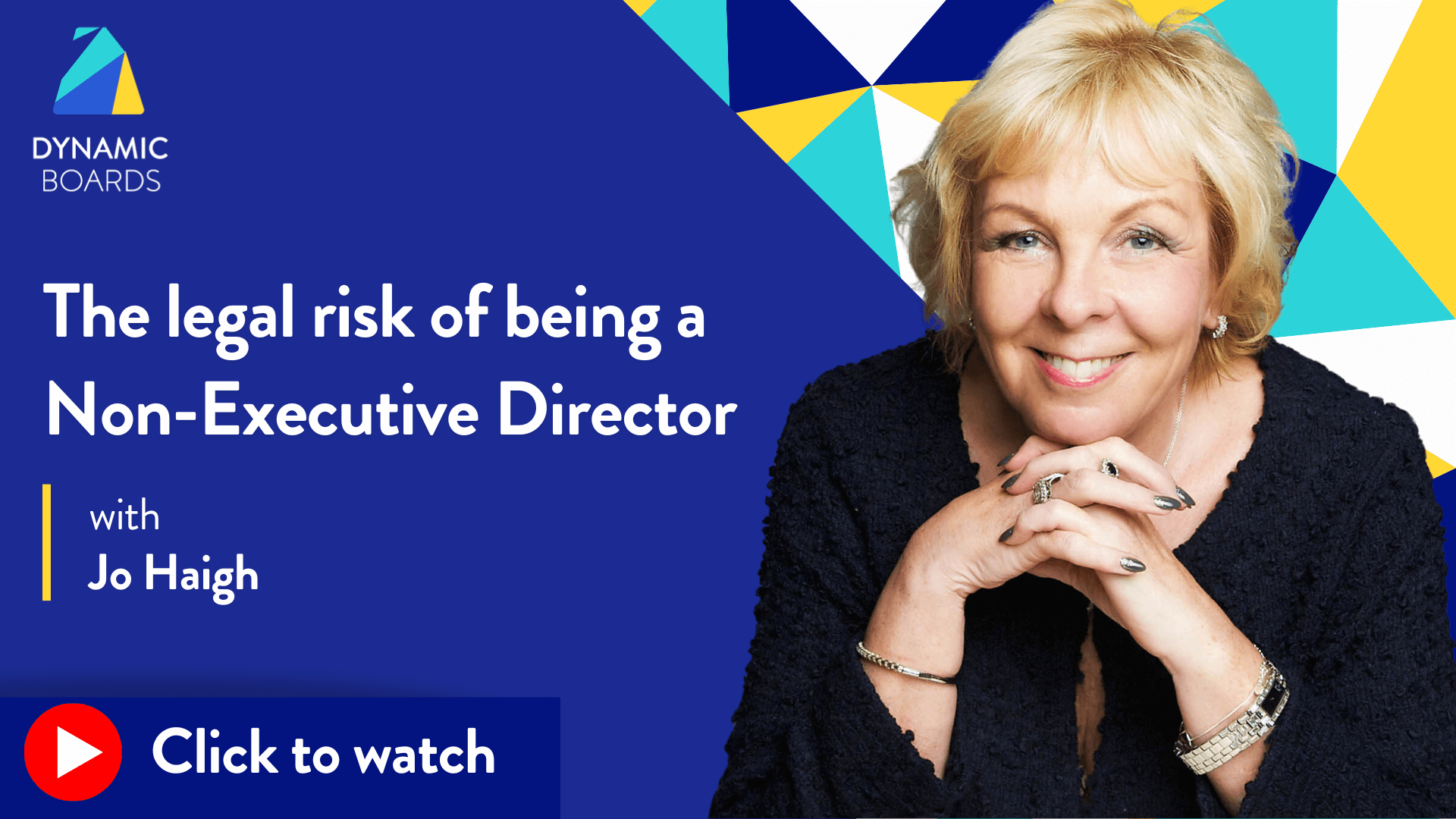
In parts one and two of this series exploring the legal risks faced by NEDs, we’ve focused on the legal requirements and duties of a Non-Executive Director, and what can happen when things go wrong. In our final blog, we look at how Non-Execs can mitigate potential legal issues while fulfilling their duties.
Jo Haigh, a lawyer by training, with experience on over 40+ boards in NED/ Chair roles, spoke to our Dynamic Boards NED Community on this topic. You can watch the full video here:
Here are Haigh’s top six fireguards for avoiding legal risks as a NED:
Get yourself a good service contract
“Often appointments are done on a handshake or a letter of appointment, which are just not good enough. They don’t contain some of the important protections that you need,” says Haigh. Having a well-drafted service contract protects Non-Execs by protecting their legal rights, clearly defining their duties and responsibilities, establishing term and termination conditions, helping to avoid risks and ensure independent decision-making. Essentially it ensures clarity, fairness and effective governance.
Check their D&O Liability Insurance
Directors and Officers (D&O) Liability Insurance will help protect Non-Execs from legal and financial risks. “I would not take up a role without it. It’s paid for by the company and is not expensive insurance at all. The word ‘officer’s’ will cover you if you are not a statutory director,” says Jo Haigh. It’s important to say that having this insurance doesn’t give NEDs the right to commit an offence. “It would be like having insurance on your house, setting fire to it and then asking the insurance to pay out. It does not pay if you commit an offence,” warns Haigh.
Ensure you have run-off cover
D&O Liability Insurance doesn’t protect Non-Execs after they leave their post. This means that they can be pursued legally years later for any decisions found to be negligent, unlawful, or in breach of their duties (such as fiduciary duties or duties of care) during their tenure on a board. This is why having run-off cover added to D&O Liability Insurance is so important as it extends protection to NEDs even after they leave the board.
Add a clause to take advice
It is essential that the agreement also has a “Right to Counsel” or “Right to Legal Advice” clause included, which allows NEDs to seek independent legal advice or counsel and navigate potential liabilities or claims. It isn’t always included as standard so is an important thing to check. “Advice is expensive so you need a clause in your contract to say that advice will be paid for up to x,” says Haigh. “If you take up a public company role, under the UK Corporate Governance Act, the company has to pay for it but not in private companies,” she adds.
Keep board papers and minutes
It is essential for NEDs to have a clause in their contract, which allows them to keep board papers and board minutes when they leave their post. “Those are your evidence,” says Haigh. Most NEDs will have these already in soft-copy form and can be forgiven to think that this doesn’t apply to them (it does!). “They [board papers and board minutes] are not yours, they belong to the company so you will need specific permission to have them,” he adds.
Put in place reserve powers for the board
The final fireguard involves putting in place reserve powers for the board. These powers are explicitly included in the company’s governance framework, often through the board’s terms of reference, the company’s articles of association, or a specific board resolution. In a nutshell, they are a backup set of powers the board can use in times of crisis or when traditional decision-making channels are not available. They are crucial in ensuring that the board remains independent and effective in managing unexpected situations. However, they are not automatically available to all board members but they can be requested by individual NEDs in the form of a proposal or motion during a board meeting. The board would then discuss the request and put it to a vote on whether or not to grant those powers but they would need to have justification to do so.
When you say ‘yes’ to joining your dream board, we’d recommend you pause for a moment, and get the foundations laid to see you through all eventualities.
Read previous:
Part 1: The Legal Role of a Non-Executive Director: Requirements and duties
Part 2: The Legal Role of a Non-Executive Director: When things go wrong
Read next:
Non-Executive Director Service Contracts: A 6 Point Checklist
—
Join our free NED Community
Are you on a UK board in a Non-Exec capacity and want to learn more about topics like this? If so, join our free NED Community! We host monthly online meetups where we hear from experts (like Jo Haigh in this article) and allow time for peer-to-peer support between Non-Execs. If you want to become a more thoughtful and effective board member, register here.
View our roles
Whether you are a first-time Non-Exec or a seasoned NED looking for your next board role, you are welcome to sign up and view our roles for free here. We list c.100 paid Non-Executive Director board roles each month from all over the UK.
Advertise your role with us
Are you/ your board recruiting a Non-Executive Director, Trustee or Chair? We can help you advertise your role to candidates who will bring the skills, experience and perspectives you need on your board. We have helped companies and search firms advertise over 1000 Non-Exec board roles a year from across the UK. You can see information on our advertising options here and you can get in touch with the Dynamic Boards team at hello@dynamicboards.co.uk



